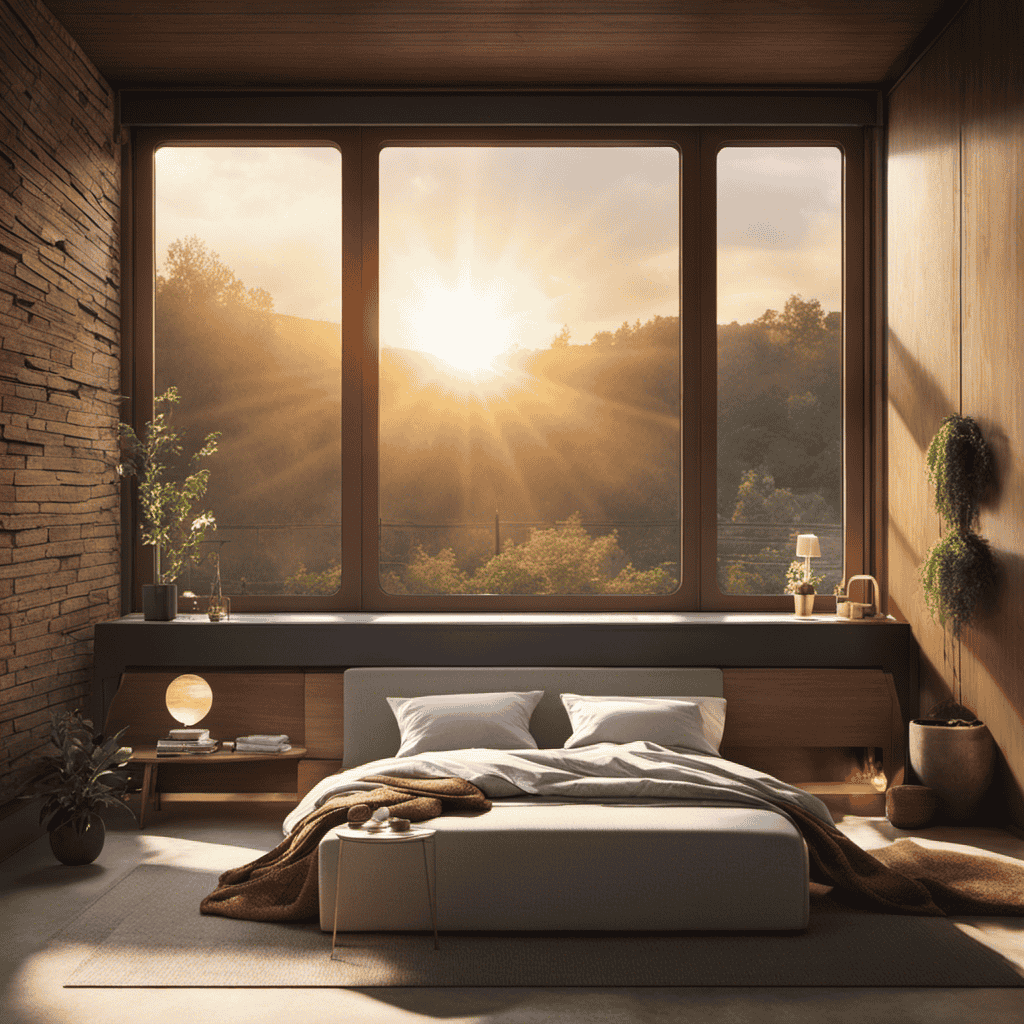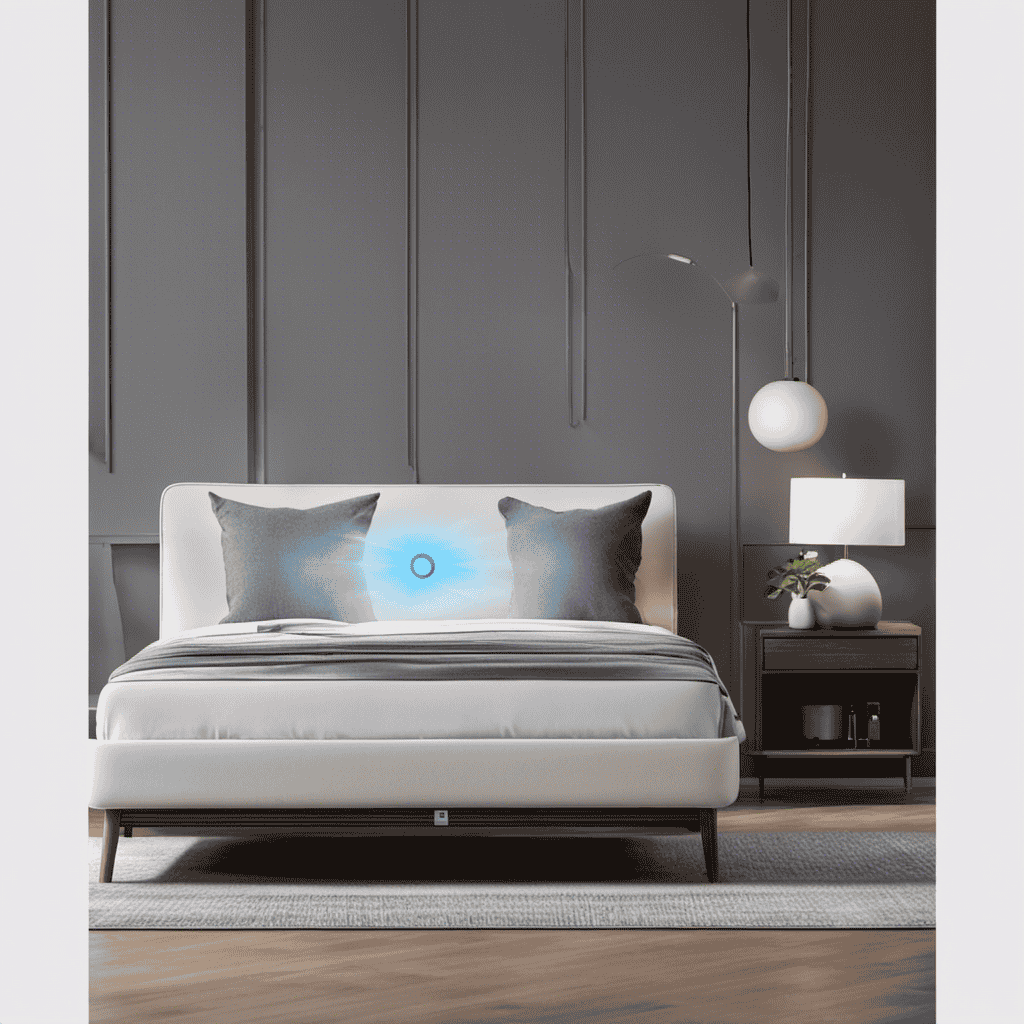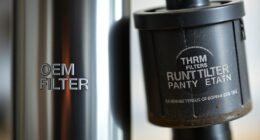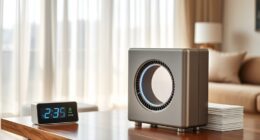It often crosses my mind, why do we overlook the significance of the air we breathe? We dedicate a considerable amount of time and energy to enhancing the quality of our food and water, yet what about the air that enters our lungs daily? This is the role of an air purifier. It shouldn’t be seen as just an indulgence; it’s essential.
In this article, I will explore the numerous health benefits of using an air purifier, how it can combat common indoor air pollutants, and why it’s crucial for improving sleep quality, enhancing allergy relief, and safeguarding the health of our children and babies.
So, let’s dive in and discover why you need an air purifier in your life.
Key Takeaways
- Air purifiers reduce allergies and improve respiratory health.
- They remove common indoor air pollutants such as dust, pet dander, and mold spores.
- Air purifiers create a cleaner and healthier environment for better sleep.
- They effectively capture and remove airborne allergens, improving overall indoor air quality.
Health Benefits of Using an Air Purifier
Using an air purifier can help me reduce allergies and improve my overall respiratory health. Indoor air pollution can have a significant impact on our health, as we spend a significant amount of time indoors.
Dust, pet dander, mold spores, and other allergens can be present in our homes, triggering allergies and asthma symptoms. An air purifier can effectively remove these harmful particles from the air, reducing our exposure to indoor air pollutants.
Studies have shown that using an air purifier can lead to a decrease in allergen levels, resulting in fewer allergy symptoms and improved respiratory health. By filtering out these pollutants, air purifiers can create a cleaner and healthier environment, allowing me to breathe easier and reduce the risk of respiratory illnesses.
Common Indoor Air Pollutants and How an Air Purifier Can Help
In this discussion, I will be exploring the topic of harmful airborne particles and how an air purifier can provide benefits in reducing their presence in indoor environments.
These particles, such as dust, pollen, and pet dander, can have negative effects on our respiratory health and overall well-being.
Harmful Airborne Particles
To protect yourself from harmful airborne particles, you should consider getting an air purifier.
Indoor air pollution can have a significant impact on respiratory health. Studies have shown that the air inside our homes can be up to five times more polluted than the air outside. This is due to various sources such as dust, pet dander, pollen, mold spores, and volatile organic compounds (VOCs) emitted from household products.
These particles can trigger allergies, asthma, and other respiratory conditions. An air purifier can help remove these harmful particles from the air, improving indoor air quality and reducing the risk of respiratory health issues.
Air Purifier Benefits
By investing in an air purifier, you’ll notice a significant improvement in the quality of the air you breathe indoors. Air purifiers are designed to remove harmful airborne particles, such as dust, pollen, pet dander, and mold spores. Not only do they help alleviate allergies and respiratory issues, but they also create a healthier living environment.
Regular air purifier maintenance is essential to ensure optimal performance and longevity. This includes cleaning or replacing filters, checking fan motors, and keeping the unit free from dust and debris.
Fortunately, there are cost-effective air purifiers available in the market that offer excellent performance without breaking the bank. It’s important to consider the size and features of an air purifier to ensure it meets your specific needs.
With proper maintenance and a quality air purifier, you can enjoy cleaner and fresher indoor air.
Improving Sleep Quality With an Air Purifier
Using an air purifier can help you sleep better at night. The quality of the air we breathe has a direct impact on our sleep. Air purifiers are designed to remove pollutants and allergens from the air, creating a cleaner and healthier environment. This can lead to improved sleep quality by reducing respiratory symptoms such as coughing, sneezing, and congestion.
By removing airborne particles and pollutants, air purifiers can also improve concentration during the day. Studies have shown that poor air quality can negatively affect cognitive function and impair productivity. By ensuring cleaner air, air purifiers can help create a more conducive environment for focus and productivity.
Enhancing Allergy Relief With an Air Purifier
When it comes to enhancing allergy relief, one important factor to consider is the ability of an air purifier to capture airborne allergens.
With its advanced filtration system, an air purifier can effectively trap and remove allergens such as pollen, dust mites, pet dander, and mold spores from the indoor air.
This not only helps to reduce allergic reactions, but also improves the overall indoor air quality, creating a healthier living environment.
Airborne Allergen Capture
To effectively capture airborne allergens, you’ll want an air purifier with a high-efficiency particulate air (HEPA) filter. These filters are designed to trap even the tiniest particles, such as pollen, dust mites, pet dander, and mold spores. With advancements in air purifier technology, maintaining clean and allergen-free air has become easier than ever. One key aspect of air purifier maintenance is regularly replacing the HEPA filter, as it can become clogged and less effective over time. Additionally, some air purifiers now come with smart features, such as sensors that detect air quality and automatically adjust the purification settings. This ensures that your indoor air remains fresh and free from allergens. Investing in a quality air purifier with advanced technology can greatly improve your respiratory health and overall well-being.
| Advancements | Benefits |
|---|---|
| Smart sensors | Automatically adjusts purification settings based on air quality |
| Wi-Fi connectivity | Allows remote control and monitoring through smartphone apps |
| Filter change indicators | Reminds you when it’s time to replace the filter |
| Quiet operation | Provides a peaceful environment while purifying the air |
Improved Indoor Air Quality
With advancements in technology, it’s now easier than ever to improve the quality of the air I breathe indoors. Air pollution is a major concern, as it can have significant impacts on respiratory health. Studies have shown that long-term exposure to indoor air pollution can lead to various respiratory problems such as asthma, allergies, and even lung cancer.
By investing in an air purifier, I can effectively remove harmful pollutants from my indoor environment. These devices are designed to capture and eliminate particles such as dust, pollen, pet dander, and even volatile organic compounds (VOCs) that can be present in the air.
This not only helps to reduce the risk of respiratory issues but also creates a cleaner and healthier living space.
The Importance of Clean Air for Children and Babies
You should prioritize clean air for your children and babies, as it promotes their overall health and well-being. Here are four reasons why clean air is important for child development and respiratory health:
-
Improved lung function: Clean air reduces the risk of respiratory problems such as asthma and allergies, allowing children to develop strong and healthy lungs.
-
Cognitive development: Studies suggest that exposure to air pollution during childhood can impair cognitive function and lead to developmental delays. Clean air provides a conducive environment for optimal brain development.
-
Reduced risk of infections: Polluted air contains harmful particles and pollutants that can weaken the immune system, making children more susceptible to infections. Clean air helps to protect against respiratory illnesses.
-
Better sleep quality: Breathing in clean air improves sleep quality, allowing children to rest and recharge properly, which is crucial for their growth and development.
Ensuring clean air for your children is essential for their overall health and proper development.
Choosing the Right Air Purifier for Your Home
Consider researching different models of air purifiers to find the one that best fits your home and meets your family’s specific needs.
When it comes to air purifier maintenance, it’s important to choose a model that is cost-effective in the long run. Look for air purifiers that have washable filters, as they can be easily cleaned and reused, saving you money on replacement filters.
Additionally, consider the energy efficiency of the air purifier to ensure it doesn’t consume excessive electricity, which can lead to higher utility bills. Look for models with energy-saving features or certifications, such as ENERGY STAR.
Frequently Asked Questions
How Much Electricity Does an Air Purifier Consume?
An air purifier consumes electricity to operate. It is important to consider the energy consumption of an air purifier when assessing its cost-effectiveness. Understanding the electricity usage can help determine its impact on your energy bills.
Can an Air Purifier Remove Odors From the Air?
Yes, an air purifier can remove odors from the air. It filters out harmful particles and pollutants, leaving the air fresh and clean. I’ve noticed a significant improvement in the air quality since using one.
Do Air Purifiers Require Regular Maintenance or Filter Replacements?
Regular maintenance and filter replacements are necessary for air purifiers. Following a replacement schedule ensures optimal performance and prolongs the lifespan of the device. Neglecting filter maintenance can lead to decreased effectiveness in purifying the air.
Can Air Purifiers Help With Reducing the Spread of Viruses and Bacteria?
Yes, air purifiers can help reduce the spread of viruses and bacteria. They effectively filter out airborne pollutants, including allergens, which can contribute to a healthier environment and minimize the risk of infection.
Are There Any Potential Health Risks Associated With Using an Air Purifier?
There may be potential health risks associated with using an air purifier, such as ozone emissions or increased humidity. It is important to consider the long-term effects and choose a purifier that meets safety standards.
Conclusion
So, after all this information, it’s clear that an air purifier is absolutely necessary for our well-being. Who needs fresh air anyway?
Who needs to sleep better, breathe easier, and protect their children from harmful pollutants? Certainly not us! Let’s continue living in ignorance, surrounded by allergens and toxins, because who needs clean air when we can have a good old coughing fit instead?
Yeah, that’s sarcasm, in case you didn’t catch it. Get yourself an air purifier, folks. Your health will thank you.










